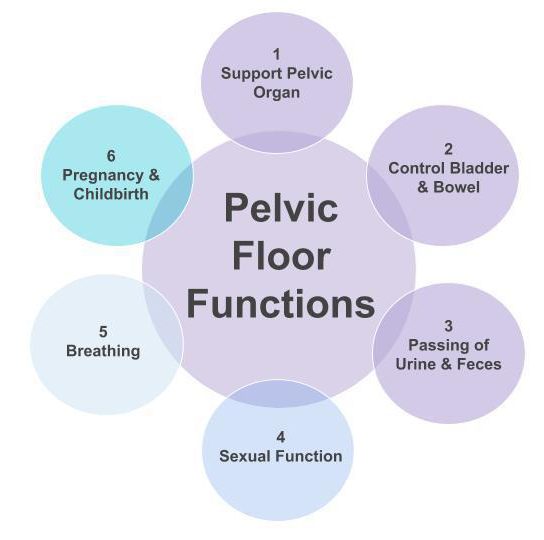/mothersopedia/media/media_files/mlBrHrs5XBlu8WDpgeSN.jpeg)
image credits @Physicians to women
Pelvic health is an important aspect of overall wellness, but it's often left untouched or misunderstood. The pelvic region consists of muscles, nerves, and organs that work together to support bodily functions like urination, bowel movements, and sexual activity.
Your pelvic organs include:
Your bladder (the pouch holding your urine).
Your uterus and vagina (in women).
Your prostate (in men).
Your rectum (the area at the end of your large intestine where your body stores solid waste)
Functions of Pelvic Floor Muscles/Region

Poor pelvic health leads to Pelvic floor dysfunction, which is the weakening or tightening of muscles, ligaments, and tissues that support the bladder, rectum, and sexual organs, hence causing pain and affecting the bladder and bowel function. A person with this condition may have trouble urinating or passing stool. Poor pelvic health leads to compromised pilot pelvic floor functions.
How does our pelvic health get compromised, hence weakened pelvic floor muscles?
- The pelvic floor can be weakened by pregnancy and childbirth.
- Prostate cancer treatment in Men
- Obesity and the straining of chronic constipation.
- Pelvic inflammatory disease (also called PID, an infection of the reproductive organs)
- Twisted or ruptured ovarian cyst.
- Miscarriage or threatened miscarriage.
- Ruptured Fallopian Tube
Symptoms of Pelvic floor Dysfunction
- A frequent need to urinate.
- a bulge somewhere in the lower pelvic region.
- Leaking of Urine while sneezing or coughing.
- Involuntary leakage of stool.
- Incomplete urination.
- Bowel movement dysfunction and pain.
- Pain during sexual intercourse.
- Unexplained pelvic pain and Sexual dysfunction
Fortunately, there are many ways to maintain and improve pelvic health. Here's what you need to know:
Understand the Basics
Before you can improve your pelvic health, it's important to understand what it is and how it works. Keep a close eye on the symptoms you might be experiencing. Poor Pelvic health leads to pain in the pelvic floor/region, which one should never ignore for good health.
Practice Good Habits
Many of the habits that promote overall health can also support pelvic health. For example, staying hydrated, eating a balanced diet, and getting regular exercise can help prevent constipation and support healthy bowel movements. Additionally, practicing good posture can help strengthen the muscles that support the pelvis.
Exercise Your Pelvic Floor
One of the most effective ways to maintain pelvic health is through pelvic floor exercises, also known as Kegels. These exercises involve contracting and relaxing the pelvic floor muscles, which can help strengthen them and improve their function. To do a Kegel, simply tighten the muscles around the vagina or anus as if you're trying to hold in urine or gas, hold for a few seconds, and then release. Repeat for 10-15 repetitions, a few times a day.
Seek Professional Help When Needed
If you're experiencing symptoms like pain, discomfort, or incontinence, it's important to seek professional help. Pelvic health issues can be caused by a range of factors, including pregnancy and childbirth, menopause, obesity, and certain medical conditions. A healthcare provider, such as a pelvic floor physical therapist, can evaluate your symptoms and recommend a treatment plan tailored to your needs.
Diet changes
As with any other problem, this Dysfunction can also be cured and prevented with a healthy lifestyle and adopting a healthy diet. Remember our body can heal itself, you just need to think right and eat right.
- Drink plenty of water.
- Herbal/Caffeine-free teas.
- Low-acidic fruits and veggies: apricots, melons, bananas, and carrots.
- Certain spices: turmeric, garlic, ginger, lemon zest, and parsley.
- Try Fish high in Omega-3 fatty acids.
Remember to always talk to your healthcare provider if you have any concerns about your pelvic health. Eat right, do your Kegels regularly, and see the difference.
Love and Support Always..!!
Also, Read: Pelvic Health 101: Best pelvic floor exercises
/mothersopedia/media/agency_attachments/DvAQhzwm8u9LzqFtI07D.png)
 Follow Us
Follow Us